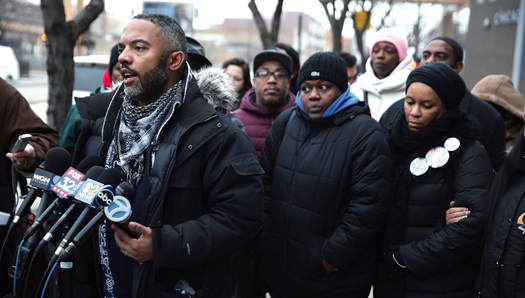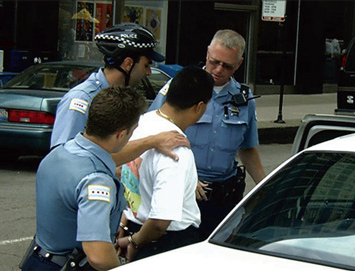‘We want justice, charges and convictions:’ Activists unimpressed by Justice Dept. report about Chicago police department failures
By Bryan Crawford -Contributing Writer- | Last updated: Jan 18, 2017 - 11:48:19 AMWhat's your opinion on this article?

Kofi Ademola, left, of the group Black Lives Matter Chicago, and other protesters talk to the media outside the Chicago Police District 1 headquarters on South State Street in Chicago on Jan. 13. Speakers were critical of the mayor and the police department and said Chicagoans already knew from experience what the Department of Justice said in its report critical of the Chicago Police department. Photo:AP/Wide World Photos
|
CHICAGO—Those who live on the city’s South and West sides are well acquainted with the harmful and damaging effects of over policing, which in far too many cases, lends itself to Blacks and Latinos being victims of violence from those sworn to protect community residents.
The shooting of LaQuan McDonald by White police officer Jason Van Dyke on October 20, 2014, happened in the midst of a string of high profile police-involved shootings, most notably Michael Brown in Ferguson, Missouri which took place in August of the same year.
However, what made the McDonald case so damning was the lengths both the Chicago Police Department and City Hall went to keep it quiet.
In December 2015, Illinois Attorney General Lisa Madigan asked the Justice Department to launch an investigation into the Chicago police tactics. On Jan. 13, the findings of the 13-month probe were released in a 164-page report that uncovered a litany of unconstitutional behavior on the part of Chicago police and a decades-long history of excessive force and violence.
“To me, this report was another farce by White people playing tricks on Black people, once again,” Jeffrey Muhammad of the Chicago Local Organizing Committee of Justice or Else! told The Final Call. “They gave us a report; findings. What we wanted was not a report. We wanted an investigation that said if you’re [a police officer] found guilty [of Constitutional violations], then you’ll receive justice. [The Department of Justice] already knew that when you give these kinds of reports, police have a certain amount of time to correct what was found. But we’ve never seen anyone held accountable. But every time we do something in our community, they make sure to hold us accountable.”
The Justice Dept. report offered little, if any solace to Chicago’s Black residents who have long known—and openly complained—about the inhumane, indecent tactics and treatment used by the Chicago Police Department. Essentially, the year-long investigation uncovered nothing that wasn’t already known.
“We knew the report was going to be damning, insidious, and show how systematic and implicit the CPDs racial hatred is, and how they use it as justification is for the occupation of our communities,” said Kofi Ademola of Black Lives Matter Chicago. “I wasn’t surprised at the information, but it did highlight how they use the violence in our communities as the justification of their policing practices. With CPD, and in police departments around the country, we know their role is to occupy the Black community to make sure we don’t have a rebellion or an uprising. How they treat us in between that is they warehouse our bodies through mass incarceration, use degrading and demeaning language, enforce stereotypes, abuse us using Tasers, firearms, and other physical and verbal abuses, all without accountability.”

Chicago police were investigated by the U.S. Dept. of Justice
|
The Justice Dept. found, among other things, that the Chicago Police Department routinely engaged in cover-ups that were confirmed by the Independent Police Review Authority assigned to conduct investigations, received coaching during misconduct interviews and used boilerplate language to justify their use of force on suspects. The so-called watchdog agency also blindly accepted police accounts as fact and manufactured evidence to support official police reports, said the Justice Dept.
“We know that the police are racist. We know they use excessive force. We knew these things. Why do you have to tell us in a report?” asked Ja’Mal Green, a local community activist and organizer in Chicago. “What we want is justice. We want charges and convictions. We want investigations into [Rahm Emanuel] and see what his role has been in the activity of the police and charge him. We want an investigation into the former state’s attorney, Anita Alvarez, and bar her from ever practicing law again. This is the type of justice we’re looking for.”
The Justice Dept. also looked into the social media accounts of city officers and found multiple examples of anti-immigrant, anti-Latino, anti-Black and anti-Muslim sentiments. Essentially, what was discovered in Chicago could broadly be applied to police departments across the country—particularly as it relates to the differences in policing tactics used in White communities versus Black and Brown ones.
“The police should not be a force that comes in after a crime has been committed. The police should be a preventative force,” said Jeffrey Muhammad. “The reason I say it like that is because the police are a preventive force on the North Side of Chicago. They are a preventive force in affluent, White neighborhoods. But they’re more militaristic in Black neighborhoods. They aren’t looking to prevent crime; they’re looking to catch criminals. They’re looking to use Gestapo tactics.”
The actions taken by police against Black and Brown people in Chicago and other cities has never resulted in any meaningful discipline against the officers accused, said activists. Instead, the victims, whether from a jail cell or the grave, are always left to defend their humanity against what was done to them, they added.
The irony of the Justice Dept. investigation into the Chicago Police Department is that it comes on the heels of a transition of power in the White House, from Barack Obama to Donald Trump. Jeff Sessions, Mr. Trump’s pick for U.S. attorney general, has long been accused of holding racial and bigoted views toward people of color during his time as senator in Alabama.
Mr. Sessions has been a staunch supporter of police and holds an even harder line against the very kinds of investigations the Justice Dept. conducted in Chicago. In 1968, Coretta Scott King accused Mr. Sessions, who was then an Alabama U.S. attorney lobbying to become a federal judge, of opposing Black civil rights and the Voting Rights Act of 1965. Her letter to Congress is cited as one of the key reasons Mr. Sessions failed to win his federal judgeship.
As Attorney General, Jeff Sessions would hold even more power to dictate, even if indirectly, what police would legally be able to do from a tactical standpoint. And it appears that Chicago will be the launching pad for what could be seen in Black communities throughout the nation.
“If we sell our own children out and say, ‘Yes, they’re thugs, savages and monsters. Get rid of them,’ we’ve greenlit the rest of us to be attacked. We have to be very careful of that,” said Mr. Ademola. “Chicago, historically has been very powerful and involved in movements for the liberation of Black people. That’s why all eyes are on Chicago. They pay attention to how we resist and they pay attention to how we fight back. And they don’t want Black people anywhere else to get any ideas when it comes to standing up for themselves against police brutality and injustice.”
INSIDE STORIES AND REVIEWS
-
-
About Harriett ... and the Negro Hollywood Road Show
By Rabiah Muhammad, Guest Columnist » Full Story -
Skepticism greets Jay-Z, NFL talk of inspiring change
By Bryan 18X Crawford and Richard B. Muhammad The Final Call Newspaper @TheFinalCall » Full Story -
The painful problem of Black girls and suicide
By Charlene Muhammad -National Correspondent- » Full Story -
Exploitation of Innocence - Report: Perceptions, policies hurting Black girls
By Charlene Muhammad -National Correspondent- » Full Story -
Big Ballin: Big ideas fuel a father’s Big Baller Brand and brash business sense
By Bryan Crawford -Contributing Writer- » Full Story






 Click Here Stay Connected!
Click Here Stay Connected!








